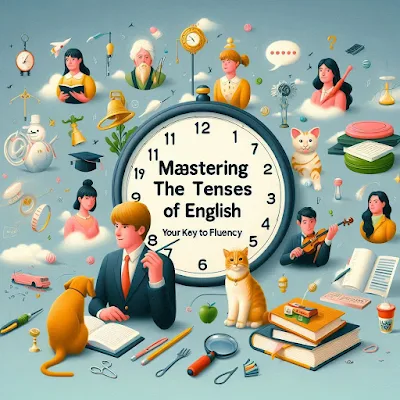 |
| Mastering the 12 Tenses of English: Your Key to Fluency |
Have you ever struggled with when to use "I am eating" versus "I eat" or "I have eaten"? You're not alone. English tenses can be a tricky aspect of the language for learners and native speakers alike. But fear not! Understanding these tenses is crucial for clear communication and can dramatically improve your English skills.
Why Are English Tenses Important?
English tenses do more than just indicate when an action occurs. They convey nuances about the duration, completion, and relevance of actions. Mastering these tenses allows you to:
- Express yourself precisely
- Understand subtle meanings in conversations and texts
- Write more professionally and effectively
- Avoid common grammatical errors
The 12 Tenses at a Glance
English has 12 major tenses, which are combinations of three time frames (past, present, future) and four aspects (simple, continuous, perfect, perfect continuous):
- Simple Present
- Present Continuous
- Present Perfect
- Present Perfect Continuous
- Simple Past
- Past Continuous
- Past Perfect
- Past Perfect Continuous
- Simple Future
- Future Continuous
- Future Perfect
- Future Perfect Continuous
Each tense serves a unique purpose. For example, the present perfect tense (e.g., "I have lived here for five years") connects a past action to the present, while the future continuous tense (e.g., "This time next week, I will be flying to Paris") describes an ongoing action in the future.
Common Challenges
Many English learners find it challenging to:
- Distinguish between similar tenses (e.g., simple past vs. present perfect)
- Use the correct auxiliary verbs (have, be, will)
- Apply the right verb forms (base, -ing, past participle)
- Understand when to use each tense in context
How to Improve Your Tense Usage
- Practice regularly with exercises and quizzes
- Read extensively in English, paying attention to tense usage
- Listen to native speakers and note how they use different tenses
- Write in English daily, experimenting with various tenses
- Use a comprehensive guide to English tenses for reference
Take Your English to the Next Level
Ready to master English tenses and elevate your language skills? We've created a comprehensive, easy-to-follow grammar book that covers all 12 tenses of English in depth. This free resource includes:
- Detailed explanations of each tense
- Example sentences and usage guidelines
- Common mistakes to avoid
- Practice exercises with answer keys
Don't let English tenses hold you back any longer. Download our free grammar book today and start your journey to English fluency!
Download Our Free English Tenses Grammar Book
Remember, mastering English tenses takes time and practice. But with the right resources and dedication, you'll be using them like a native speaker in no time. Happy learning!
